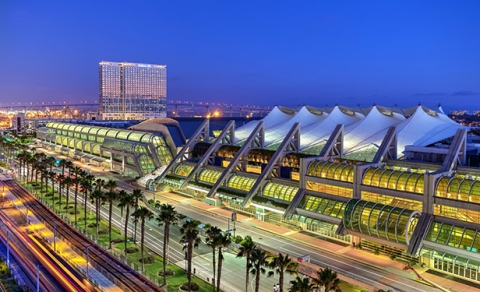San Diego and Dallas Convention Centers Serve as Temporary Shelters for Migrant Children

The San Diego Convention Center and the Kay Bailey Hutchison Convention Center in Dallas are lending a hand to help the humanitarian crisis at the southwest U.S. border by providing temporary housing for unaccompanied migrant children seeking asylum. The creation of such emergency intake sites is designed to shift the minors — most of whom herald from Guatemala, Honduras and El Salvador — more quickly out of U.S. Border Patrol custody while helping to alleviate overcrowding at border holding facilities.
San Diego Convention Center
On March 22, the City and County of San Diego announced that they will make the SDCC available for the U.S. Department of Health and Human Services to use as a temporary shelter for minors up to age 17. Many details remain unknown, including how many children will be sheltered at the venue and when they will arrive.
Said San Diego Mayor Todd Gloria and San Diego County Board of Supervisors’ Chair Nathan Fletcher in an official statement:
“When HHS Secretary Xavier Becerra requested our help to house some of the unaccompanied minors at the border, we knew it was the right thing to do. Over the weekend, we agreed to open our convention center to the federal government for use as a temporary shelter. The city and county will support this federally funded effort by providing vital services to these vulnerable children who came to our country seeking safety. We are working closely with our federal partners to finalize the details for preparing to receive these young people and provide them with care, compassion and a safe space to transition while they are reunited with families or sponsors.”
Once operational, the site will be used for approximately 90 days, with the average stay for each child averaging 30-35 days. During this time, the kids will be provided with food, medical care, a place to sleep and showers. A safe and secure recreation area will also be created on the exterior of the facility. The children will not be permitted to leave the facility until they are reunified with family members in the U.S. or connected with other sponsors.
The Health and Human Services Refugee Resettlement Program will fund the temporary shelter, and additional partners include the Federal Emergency Management Agency, Center for Disease Control and the SDCC.
According to Rip Rippetoe, SDCC president and CEO, the venue will serve in this capacity until July, with detailed plans in place to ensure a smooth transition to event activity in August.
“In response to this call to action from government leaders, our San Diego Convention Center team will extend our spirit of service and hospitality to this emergency use as a temporary shelter for unaccompanied children seeking asylum,” Rippetoe said. “Though we’re eager to return to our primary role as a public gathering place and economic driver for our region, I am proud of the professionalism and expertise of our team as we rise to meet each new challenge during the pandemic.”
He added, “Together with our partners, we will provide a comfortable and humane environment for the children while they are reunited with their families.”
The effort comes as the City of San Diego, County of San Diego, Regional Task Force on the Homeless and San Diego Housing Commission has wound down Operation Shelter to Home, a successful program hosted at the SDCC to protect people experiencing homelessness from COVID-19.
Kay Bailey Hutchison Convention Center
On March 17, the KBHCC in downtown Dallas began taking in unaccompanied teenage boys into what is being called a “decompression center.” It is estimated that there are now more than 2,000 migrant youth staying at the convention center.
KBHCC officials referred all TSNN questions to HHS, which did not respond to requests for comment by press time.
According to news reports, the convention center is being leased for $8 million by the federal government for 75-90 days for the effort, with FEMA and HHS responsible for all food, security, cleaning and medical care costs at the facility.
Up to 3,000 minors may be housed at the temporary location. The teens could remain at the facility for 30-45 days while officials work to locate family members as sponsors, according to an HHS statement. While staying with family, the teens will wait for asylum proceedings.
According to a recent AP news report, U.S. authorities encountered immigrant children traveling alone 9,457 times in February, nearly double the number in January and the highest since May 2019, when the figure almost reached 12,000 during the peak of a surge during the Trump presidency.
“Collective action is necessary, and we will do our best to support this humanitarian effort,” said Dallas City Manager T.C. Broadnax in a statement.
Don’t miss any event-related news: Sign up for our weekly e-newsletter HERE and engage with us on Twitter, Facebook, LinkedIn and Instagram!


Add new comment